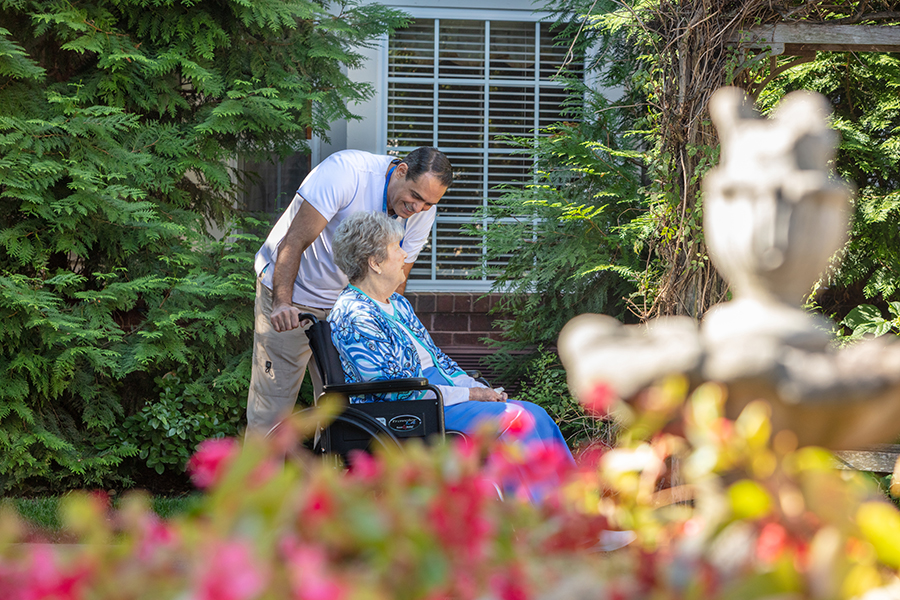Understanding Alzheimer’s Disease

November is National Alzheimer’s Disease Awareness Month. We hope you’ll join us in supporting efforts to understand more about this most common form of dementia and in working toward a cure for the disease. If you visit the Alzheimer’s Association website – alz.org – you’ll find lots of good information, as well as opportunities to help raise awareness and raise funds for research.
What is Alzheimer’s disease?
A disease of the brain that interrupts the relationship between learning and memory, Alzheimer’s occurs most often in people who are 65 and older. It is not, however, a normal part of aging. Early-onset Alzheimer’s disease does affect younger people; today, there are about 200,000 people under the age of 65 with the disease. Alzheimer’s is a progressive disease, worsening over time. In the early stages of the disease, memory loss may be mild. As the disease advances, however, it affects the ability to carry on conversations and respond to one’s environment.
Alzheimer’s disease affects the cells of the brain, interrupting their ability to perform as they should. Ultimately, damage to the cells spreads, the cells lose their ability to function and, ultimately, die. This cell death causes irreversible damage to the brain.
What are the early signs and symptoms of Alzheimer’s disease?
According to the Alzheimer’s Association, the following 10 signs can be indicators of the disease.
- Memory loss that disrupts daily life
- Challenges in planning or in solving problems
- Difficulty completing familiar tasks
- Confusion with time or place
- Difficulty with visual images and spatial relationships
- New problems with words when speaking or writing
- Misplacing things and losing the ability to retrace steps
- Decreased or poor judgement
- Withdrawal from work or social activities
- Changes in mood and personality
Though some memory loss is a normal part of the aging process, memory loss caused by Alzheimer’s disease disrupts everyday life in significant ways.
What’s the best way to care for someone with Alzheimer’s disease?
If you or a loved one are experiencing symptoms, the first step is to talk to a medical professional. Memory problems can be caused by a number of conditions; only a thorough examination and accurate diagnosis will lead to appropriate treatment and care.
Caring for someone with Alzheimer’s can be both rewarding and challenging. The following suggestions will help you offer effective support.
- Maintain a daily routine. A routine will help you and your loved one know what to expect and will help avoid unnecessary confusion.
- Keep things simple. Overstimulation – presenting too many options, speaking in long and complicated sentences – can complicate decision-making and general communication.
- Offer reassurance. Your loved one wants to feel safe, not anxious.
- Avoid arguments and loud voices. Your calm voice is much more effective than a combative one.
What resources are available to caregivers?
November is also Family Caregivers Awareness Month. If you’re reading this story, you likely know someone with Alzheimer’s – and you may very well be providing care for a loved one with the disease. As caregivers ourselves, we at Parc Provence understand the particular challenges and privileges that come with offering support to people with Alzheimer’s. And we want to honor you and all families and friends who participate in this specialized kind of care. Your compassion, patience, humor, and love are essential to those living with Alzheimer’s.
If you are ready to consider a residential community for your loved one, we encourage you to spend time considering the various options available to you. Look closely at medical care expertise, activity programs, ambiance, and daily living options.
Parc Provence is the St. Louis region’s premier memory-care facility, specializing in caring for those living with Alzheimer’s disease and other forms of dementia. We offer the most advanced care available, providing a quality of life – through programs that nurture mind, body, and spirit – that is unparalleled.
To learn more about Parc Provence or schedule a visit, call 314-697-2081. We are here to help.





